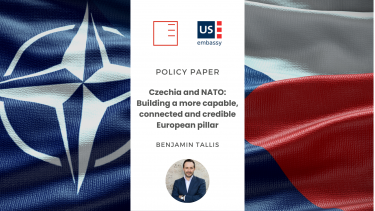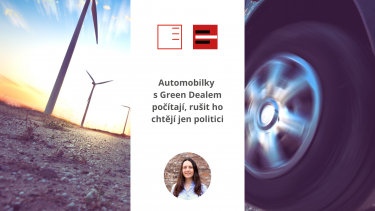Policy paper | Czechia and NATO: Building a more capable, connected and credible European pillar
CEE allies are key to building the capabilities-based, European Pillar NATO needs to enact genuine burden shifting and secure the alliance’s future. Dr Benjamin Tallis shows how Czechia can build on recent progress in defense procurement and increase its influence by prioritising the six elements Euro-NATO needs: core national war-fighting capabilities, logistics, military mobility, strategic enablers, air defence and long-range strategic strike.
Show moreiRozhlas.cz | Automobile companies are on board with the Green Deal, it is only politicians who want to scrap it
The Green Deal for Europe is an ambitious strategy to ensure that Europe becomes the first climate-neutral continent by 2050. Most of the parties running for the European Parliament want to change this strategy, despite the fact that the car companies are already anticipating the transition. EUROPEUM Institute researcher Kateřina Davidová commented on the topic in an article for iRozhlas.cz.
Show more
Café Evropa: České Budějovice 20 years in EU
We invite you to the next debate of the Café Evropa series. Come and talk to us about what current european issues are resonating in České Budějovice and how you imagine Europe. Are you interested in nuclear energy, electromobility, euro, local projects supported by the EU, culture or any other european topics?
Show morePolicy Paper | FROM STICK SHIFT TO SKILL SHIFT? Reskilling of automotive's employees in the eyes of the industry's stakeholders
There is no time to wait in retraining the employees of car manufacturers if we do not want our car industry to fossilize and disappear. Writes Rebeka Hengalová, research fellow at EUROPEUM Institute.
Show moreHospodářské noviny | More than five million people will need to be retrained in the Czech Republic by 2030. Car industry will mainly face the problems
The Czech car industry is lagging behind the rest of Europe and the world. It may not be able to pick what to produce, but it has the opportunity to strengthen its competitiveness and resilience. However, it needs trained and educated employees, which are hard to find on the local labour market. So are we going to train the automotive workforce, strengthen the position of our strategic sector and promote a just transformation? Or are we going to continue to say that the transition to electric mobility does not concern us and that the Green Deal for Europe is to blame for increased unemployment? How to produce electric cars and remain competitive? Rebeka Hengalová, a researcher at EUROPEUM Institute, discusses this topic in her article for economic daily Hospodářské noviny.
Show morePolicy Paper | Securing Europe’s Lithium Future: The Cinovec project and sustainable lithium mining
The EU's proactive stance, introduced in the Critical Raw Material Strategy and later Critical Raw Materials Act (CRMA), drives the EU approach to secure the supply of European/domestic critical raw materials for EV battery production. The Cinovec project has a large economic potential as it enhances the ability to secure domestic and regional supply of lithium, which is otherwise very geographically concentrated outside of Europe. Europe relies on a handful of countries, particularly China, for the import of lithium for the production of EV batteries.
Show moreREPORT: The Round Table Electromobility And Work Opportunities: What Changes Await Us?
For the second time, experts on employment in the automotive industry and its transformation met, this time at the regional level of the Moravian-Silesian Region. The topic of labour changes in connection with decarbonisation and electromobility was discussed by representatives of automobile companies, trade unions, employers' associations, regional and state administration. The round table was organized in cooperation with Charles University, CELSI Institute, and Hyundai Nošovice. The report was written and the debate was moderated by researcher Rebeka Hengalová.
Show more PDFE15: EU emission standards will not be enough for China. Beijing is preparing its own rules
The EU countries have decided that the sale of new cars with internal combustion engines will end by 2035 at the latest. Although this is a highly controversial move in the Czech Republic, it is unlikely to be of much significance in the context of the global new car market. The new Euro 7 emissions standard will be the same. Our Senior Research Fellow Vít Havelka commented on this topic.
Show more
EU-Pacific Talks: In-EV-itable future of automotive industry: what is the role of the Pacific region
We would like to invite you to the debate called "EU-Pacific Talks: In-EV-itable future of automotive industry: what is the role of the Pacific region" in the EU-PACIFIC Talks series. The debate will take place online on Tuesday, May 30 at 13:00.
Show more
Prague Climate Academy
In 2023, the Green Europe team of EUROPEUM Institute for European Policy introduced a series of workshops aimed at communicating the topic of green transformation to the Czech public. The aim is to support journalists and civil society in developing public discourse on climate change and climate policies. Last year, the Prague Climate Academy focused on sustainability in transport. The topic of the first workshop was the decarbonisation of car transport in the context of electromobility. The second workshop focused on transport sustainability in the city of Prague. In 2024, we are following up with the topic of city adaptation to climate change. We will offer a series of discussions and workshops with experts on public space adaptation, blue-green measures, and public participation.
Show more

Staroměstské náměstí 4/1
Prague 1 - Staré Město
110 00
tel.: +420 212 246 552
email: europeum@europeum.org
https://www.europeum.org









